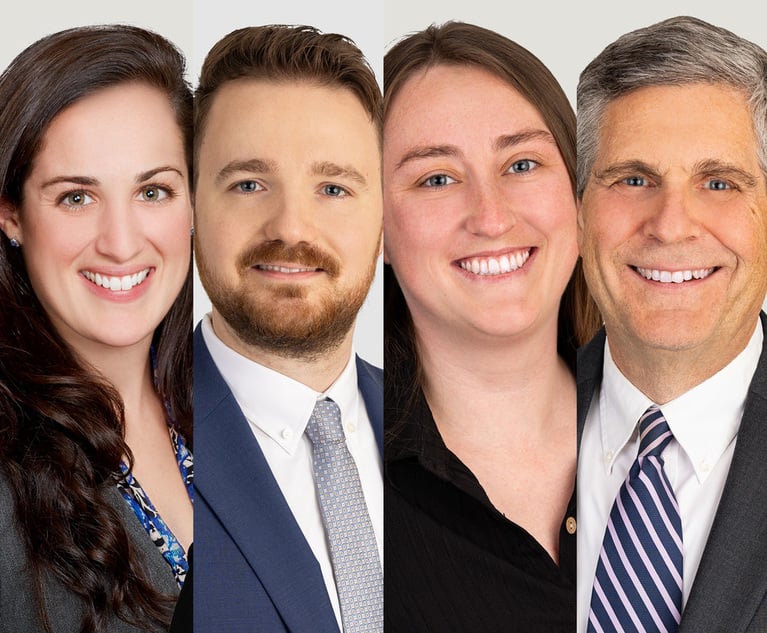 “Understanding Connecticut's Freedom of Information Act” by Mark J. Sommaruga.
“Understanding Connecticut's Freedom of Information Act” by Mark J. Sommaruga.When Is It Public, and How Do You Get It?: CT FOI Guide Updated
From understanding meeting agendas to making records requests and understanding rules governing email communications, the 146-page book covers a range of official definitions and procedures for review and use by lawyers, media and the general public.
March 29, 2019 at 10:50 AM
3 minute read
Pullman & Comley attorney and author Mark J. Sommaruga has released the fifth edition of his book on Connecticut Freedom of Information law, “Understanding Connecticut's Freedom of Information Act.”
From understanding meeting agendas to making records requests and understanding rules governing email communications, the 146-page book covers a range of official definitions and procedures for review and use by lawyers, media and the general public for knowing how and where to request and obtain public information. The subject matter is divided into three sections: public meetings, accessing public records and civil penalties/remedies.
In an interview, Sommaruga said there are some statutory changes covered in the latest edition, including information on how the state's Freedom of Information Commission deals with vexatious requests. “I represent public agencies the majority of the time, and the presumption is most times that information is public record,” he said, acknowledging that many public boards and agencies still have a lot of learning to do when it comes to releasing information in a timely fashion.
“There is a varying degree of sophistication with boards,” Sommaruga said, referring to municipal government and school boards with whom he regularly works. “Some agendas comply very well with FOI and others look like they're from the 1950s.” Conveying the basics on creating properly detailed agenda items and knowing who to notify about requests for personnel records can be a challenge. Technological factors, including the use of cellphones to copy pages of public documents, have also been and updated. If you want to know when it's appropriate to go into executive session or which personnel files are exempt from disclosure, this book is a useful tool.
 Mark J. Sommaruga
Mark J. Sommaruga
While Sommaruga most often represents parties from whom information is being requested, he said education on both sides is crucial. “I think if both sides know the rules of the game, we're all better off. If people understand why sometimes information must remain private, it's better for the person requesting it. On the other hand, it's important for boards and agencies to understand there is a presumption that you must comply with these requests. It's an important responsibility. It may not be job one, but it's at least job three or four.”
Sommaruga chairs Pullman & Comley's school law section and has provided legal counsel to numerous Connecticut town and school boards. He also counsels public and private clients on labor and employment and education law issues.
“Understanding Connecticut's Freedom of Information Act,” published by Pullman & Comley, is jointly distributed by the firm and the Connecticut Association of Boards of Education.
This content has been archived. It is available through our partners, LexisNexis® and Bloomberg Law.
To view this content, please continue to their sites.
Not a Lexis Subscriber?
Subscribe Now
Not a Bloomberg Law Subscriber?
Subscribe Now
NOT FOR REPRINT
© 2024 ALM Global, LLC, All Rights Reserved. Request academic re-use from www.copyright.com. All other uses, submit a request to [email protected]. For more information visit Asset & Logo Licensing.
You Might Like
View All
After 2024's Regulatory Tsunami, Financial Services Firms Hope Storm Clouds Break

Judge Slashes $2M in Punitive Damages in Sober-Living Harassment Case

Managing Partner Vindicated in Disciplinary Proceeding Brought by Former Associate
5 minute read
Connecticut Movers: Year-End Promotions, Hires and an Office Opening
5 minute readTrending Stories
- 1'Largest Retail Data Breach in History'? Hot Topic and Affiliated Brands Sued for Alleged Failure to Prevent Data Breach Linked to Snowflake Software
- 2Former President of New York State Bar, and the New York Bar Foundation, Dies As He Entered 70th Year as Attorney
- 3Legal Advocates in Uproar Upon Release of Footage Showing CO's Beat Black Inmate Before His Death
- 4Longtime Baker & Hostetler Partner, Former White House Counsel David Rivkin Dies at 68
- 5Court System Seeks Public Comment on E-Filing for Annual Report
Who Got The Work
Michael G. Bongiorno, Andrew Scott Dulberg and Elizabeth E. Driscoll from Wilmer Cutler Pickering Hale and Dorr have stepped in to represent Symbotic Inc., an A.I.-enabled technology platform that focuses on increasing supply chain efficiency, and other defendants in a pending shareholder derivative lawsuit. The case, filed Oct. 2 in Massachusetts District Court by the Brown Law Firm on behalf of Stephen Austen, accuses certain officers and directors of misleading investors in regard to Symbotic's potential for margin growth by failing to disclose that the company was not equipped to timely deploy its systems or manage expenses through project delays. The case, assigned to U.S. District Judge Nathaniel M. Gorton, is 1:24-cv-12522, Austen v. Cohen et al.
Who Got The Work
Edmund Polubinski and Marie Killmond of Davis Polk & Wardwell have entered appearances for data platform software development company MongoDB and other defendants in a pending shareholder derivative lawsuit. The action, filed Oct. 7 in New York Southern District Court by the Brown Law Firm, accuses the company's directors and/or officers of falsely expressing confidence in the company’s restructuring of its sales incentive plan and downplaying the severity of decreases in its upfront commitments. The case is 1:24-cv-07594, Roy v. Ittycheria et al.
Who Got The Work
Amy O. Bruchs and Kurt F. Ellison of Michael Best & Friedrich have entered appearances for Epic Systems Corp. in a pending employment discrimination lawsuit. The suit was filed Sept. 7 in Wisconsin Western District Court by Levine Eisberner LLC and Siri & Glimstad on behalf of a project manager who claims that he was wrongfully terminated after applying for a religious exemption to the defendant's COVID-19 vaccine mandate. The case, assigned to U.S. Magistrate Judge Anita Marie Boor, is 3:24-cv-00630, Secker, Nathan v. Epic Systems Corporation.
Who Got The Work
David X. Sullivan, Thomas J. Finn and Gregory A. Hall from McCarter & English have entered appearances for Sunrun Installation Services in a pending civil rights lawsuit. The complaint was filed Sept. 4 in Connecticut District Court by attorney Robert M. Berke on behalf of former employee George Edward Steins, who was arrested and charged with employing an unregistered home improvement salesperson. The complaint alleges that had Sunrun informed the Connecticut Department of Consumer Protection that the plaintiff's employment had ended in 2017 and that he no longer held Sunrun's home improvement contractor license, he would not have been hit with charges, which were dismissed in May 2024. The case, assigned to U.S. District Judge Jeffrey A. Meyer, is 3:24-cv-01423, Steins v. Sunrun, Inc. et al.
Who Got The Work
Greenberg Traurig shareholder Joshua L. Raskin has entered an appearance for boohoo.com UK Ltd. in a pending patent infringement lawsuit. The suit, filed Sept. 3 in Texas Eastern District Court by Rozier Hardt McDonough on behalf of Alto Dynamics, asserts five patents related to an online shopping platform. The case, assigned to U.S. District Judge Rodney Gilstrap, is 2:24-cv-00719, Alto Dynamics, LLC v. boohoo.com UK Limited.
Featured Firms
Law Offices of Gary Martin Hays & Associates, P.C.
(470) 294-1674
Law Offices of Mark E. Salomone
(857) 444-6468
Smith & Hassler
(713) 739-1250










